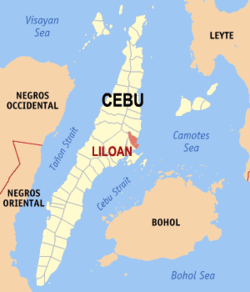Liloan, Cebu
| Liloan | |
|---|---|
| Municipality | |

Bagacay Point Lighthouse
|
|
| Nickname(s): The Light of the North | |
| Motto: Abante Lilo-an! | |
 Map of Cebu with Liloan highlighted |
|
| Location within the Philippines | |
| Coordinates: 10°24′N 123°59′E / 10.4°N 123.98°ECoordinates: 10°24′N 123°59′E / 10.4°N 123.98°E | |
| Country | Philippines |
| Region | Central Visayas (Region VII) |
| Province | Cebu |
| District | 5th District of Cebu |
| Founded | 1845 |
| Barangay | 14 (see § Barangays) |
| Government | |
| • Type | Sangguniang Bayan |
| • Mayor | Christine Frasco (1‑Cebu) |
| • Vice mayor | Duke Frasco |
| • Town Council |
Members
|
| • Representative | Red Durano |
| Area | |
| • Total | 45.92 km2 (17.73 sq mi) |
| Population (2015 census) | |
| • Total | 118,753 |
| • Density | 2,600/km2 (6,700/sq mi) |
| • Voter (2016) | 62,429 |
| Time zone | PST (UTC+8) |
| ZIP code | 6002 |
| IDD : area code | +63 (0)32 |
| Income class | 1st class, partly urban |
| PSGC | 072227000 |
| Website | www |
Liloan (also spelled Lilo‑an) is a 1st municipal income class municipality in the province of Cebu, Philippines. According to the 2015 census, it has a population of 118,753. In the 2016 electoral roll, it had 62,429 registered voters.
Liloan lies within Metro Cebu.
Along its coastline, there is spot called Silot, where a whirlpool is created by the ebbs and flows of the waters from the bay. This phenomenon is called lilo in Cebuano. Because of this, the town was known as Liloan, meaning "a place where there is a lilo".
Some time in the 1970s, a newspaper article stated that the "pueblo de Lilo‑an" was separated from the municipality of Mandaue (now Mandaue City), and was created a new municipality in 1840. However, in his "Breve reseña de lo que fue y de lo que es la Diócesis de Cebú en las Islas Filipinas," Redondo (1886) states that Lilo‑an was created as a parish in 1845 (in 1995, Lilo‑an celebrated its sesquicentennial - 150th – anniversary.)
The creation of the municipality of Lilo‑an could have been at the same time the parish was established, but not earlier than its being a parish. As recorded, the first priest of Lilo‑an served in 1845. The term of the first mayor was from 1845–1846.
During the war years (World War II), Lilo‑an had three mayors at one time. The elected mayor was Catalino Noval. The Japanese Occupation Forces appointed another, Pascual Delgado. Not to be outdone, the Guerilla Forces also designated another, Jose Cañete.
Liloan comprises 14 barangays:
In the 2016 electoral roll, it had 62,429 registered voters, meaning that 53% of the population are aged 18 and over.
One of the best known landmarks in Lilo‑an is its historic lighthouse at Bagacay Point. The original lighthouse was built in 1857 by the Spanish. The current tower was constructed in 1904 by order of William Howard Taft, the first Governor-General of the Philippines and later the President of the United States. The tower is 22 metres (72 ft) tall and remains in active use today, using solar energy. The lighthouse was declared a National Historical Landmark in 2004 by the National Historical Commission of the Philippines (formerly known as National Historical Institute).
...
Wikipedia

